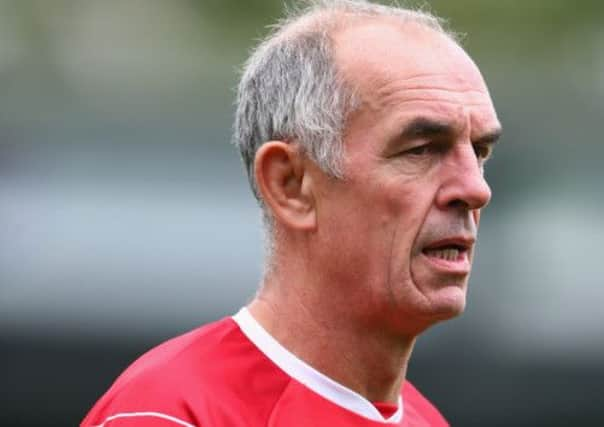Why can’t we be as good as Dutch, asks Joe Jordan


Taking time out from continuing to help Redknapp bang Queens Park Rangers into the kind of shape needed to march straight back into the English Premier League next season, Jordan talks about all things football with a candour one would expect from a once-fearsome centre forward, now an equally formidable coach.
Despite QPR’s fine start to their Championship campaign in which the team has performed well – if not quite to the standards Jordan and the gaffer expect yet – the former Leeds, Manchester United and AC Milan forward was somewhat guarded with his answers about his own coaching options, using a characteristic caution when explaining that there were too many “hypotheticals” to be drawn on whether he would have assisted Redknapp had the former West Ham and Tottenham Hotspur boss become England head coach or whether he would have taken the Scotland job himself.
Advertisement
Hide AdAdvertisement
Hide AdHowever, such prudence evaporates when the issue of youth football comes up. “I don’t know what’s going on [in Scotland] and I’ve asked numerous people,” Jordan says. “The future is what is or isn’t coming through the ranks at youth level. I see countries like Croatia and Uruguay – countries like us but that can produce top players through the last number of years while we can’t.”
Jordan does admit that the current Scotland side that defeated Croatia at Hampden is one of the best he has seen in years, but he suggests that is because an impressive number feature in the English Premier League. However, it is underneath that level where the worry lies.
“What is going on at youth level in a country the size and population we have is not an excuse: look at the Dutch, who have produced players over the last few decades that we have rightly said were world class. I don’t see the reason why that can’t happen in Scotland. In my youth there were world-class Scottish players and some of the best players in Europe. Why that is not happening now and what is going to happen in the future is going to have to be looked at. No-one has given me the answer.”
As ever, Jordan sees solutions in players playing the game. He speaks of how humble beginnings in Scotland for a new generation can lead to bigger and better things, with a new caste being relied upon because of lack of money. Any football in the public eye means that even lower-division players can be spotted, much as Jordan was when he was snapped up by Leeds after only six competitive games for Morton.
“For the first time in a long time, we at QPR have actually been given names of young Scottish players that are worth having a look at,” Jordan says. “I’m not saying there have been loads of recommendations, but we’ve had a few – to the point where we’ve actually sent people up to Scotland to look at them.”
Having played in Italy, Jordan extols the virtues of leaving one’s home country to pursue opportunities. His only regret, he says, is that Leeds United blocked him from moving to Bayern Munich after the German giants made an approach for him following the 1975 European Cup final between the pair.
“I had options that were denied me, which stuck in my throat. They were denied me because in those days if you were under contract and a club had your registration, no matter what you did or even if your contract had expired you couldn’t move and I was in that position in 1975 where I got an offer to go to Bayern Munich. I remained with Leeds a few more years but I wanted to go abroad. So as much as I’ve said about being in control of your destiny as a football player, that one I couldn’t. In my day if your contract finished, a club could hold on to your registration and you could do diddly-squat. It wasn’t right; it was unfair.”
He suggests that more player power in terms of leaving a club once contracts are up can only be a good development in the game and says that being a player in modern football is the most fortunate and rewarding position one can be in. Certainly not like in management, where futures are less certain.
Advertisement
Hide AdAdvertisement
Hide Ad“I think as a player you have some control of your destiny or future. In managing, coaching, this, that and the other I don’t think you do…” Why is that? “Because you get the sack, that’s why. As a player you might not be looked upon as, ‘he’s done the job for us’ or they want someone better but if you apply yourself right or if you have something to offer you will get other opportunities.”
Having called time on his own playing career in his late 30s, Jordan says he does not miss playing. However, the old competitive edge is still there, even if he claims he has matured measurably since he last kicked a ball in competition.
When drawn on the incident at the San Siro in February 2011 when he clashed with AC Milan player Rino Gattuso outside Tottenham Hotspur’s technical area, he simply fixes his unyielding brown eyes and says: “I’m not stupid. I knew what was happening; I knew what was going to happen. If I had been younger or if it had been in a game of football I don’t want to say that I would have reacted differently, but I wouldn’t have forgotten. I wouldn’t have forgotten the incident, that is a certainty.”
Then, with a smile he says he will not look too far ahead for QPR this season, concentrating first on today’s visit to face Millwall, while he is hesitantly hopeful that this is another long-term project in harness with Harry. He is, after all, a cautious man.